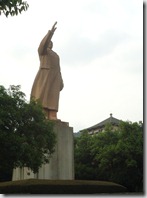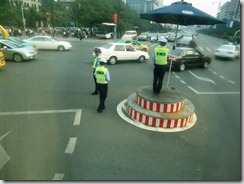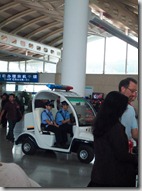 I expected the government to be a constant and pervasive presence throughout my visit to China – from Western media, we build up an image of an institution that is always watching, always listening, always controlling: heavy-handed and coarse. My initial encounter with the great Firewall was exactly in-line with those expectations, opportunities to share ideas and publish opinions were severely restricted and search was less effective at finding information.
I expected the government to be a constant and pervasive presence throughout my visit to China – from Western media, we build up an image of an institution that is always watching, always listening, always controlling: heavy-handed and coarse. My initial encounter with the great Firewall was exactly in-line with those expectations, opportunities to share ideas and publish opinions were severely restricted and search was less effective at finding information.
A friend sent me an overall advisory on Chinese government internet monitoring: I’m not sure how true it is, but I took the overall point and didn’t access bank accounts or confidential records while in Asia.
That said, there were few other signs of the government during my stay.
Every city had a central government building, set apart from the city center and all of the style we might associate with banks.  A high fence, wide concrete apron with a tall flagpole, surrounding a square, solid 5-story building with the Party symbol at the top. There never seemed to be much activity, no cars through the gate or people talking in the yard, but it was always gleaming, neat-as-a-pin, radiating authority and efficiency. No explosion of signs, billboards, mottos, or loudspeakers, either in the vicinity or anywhere that I went.
A high fence, wide concrete apron with a tall flagpole, surrounding a square, solid 5-story building with the Party symbol at the top. There never seemed to be much activity, no cars through the gate or people talking in the yard, but it was always gleaming, neat-as-a-pin, radiating authority and efficiency. No explosion of signs, billboards, mottos, or loudspeakers, either in the vicinity or anywhere that I went.
Police and uniformed security were more common that in Western society, although it was impossible to understand what the rainbow of uniforms meant without being able to read the shoulder patches.  Most of the police that I saw were in intersections, managing traffic, and in airports. One night, a 20-something on a scooter grazed a pedestrian: the police drove in, stood him next to his motorcycle, took a snapshot with a cellphone, then hustled him into a patrol car without hesitation or discussion. Efficient, silent, surprisingly subtle.
Most of the police that I saw were in intersections, managing traffic, and in airports. One night, a 20-something on a scooter grazed a pedestrian: the police drove in, stood him next to his motorcycle, took a snapshot with a cellphone, then hustled him into a patrol car without hesitation or discussion. Efficient, silent, surprisingly subtle.
The army was more evident around national monuments. A phalanx of soldiers stepped in unison through an exhibit hall before distributing themselves around the doorways. A soldier stood at attention inside the Forbidden City, body motionless, eyes constantly flicking over the crowd. New recruits drilled in parade grounds alongside a police station.  Some of it may have been in anticipation of the October 1 national holiday, public squares and parks were being decorated all week. But it was consistent with the security I’d find in most US cities, post-9/11 environment: something you notice but that only causes minor inconvenience.
Some of it may have been in anticipation of the October 1 national holiday, public squares and parks were being decorated all week. But it was consistent with the security I’d find in most US cities, post-9/11 environment: something you notice but that only causes minor inconvenience.
Our speakers and guides were boosterish, but open: they easily acknowledged both the advantages and shortcomings of living and doing business in China, and had specific examples of how corruption and social failures were being addressed. China Daily was surprisingly blunt in it’s assessments. I don’t buy the assurances that things have changed, but didn’t expect hearing both sides either. People were curious and open in conversations: discussions of local health care systems were very self-critical, acknowledging that too few people get care and the system is too slow and expensive compared to Western standards.
 Still, there is always the feeling that the Party is hidden just beneath the surface. There were many plainclothes officers in Beijing (right), and others in our group told stories of how security would melt from out of crowds when dissent emerged in city squares.
Still, there is always the feeling that the Party is hidden just beneath the surface. There were many plainclothes officers in Beijing (right), and others in our group told stories of how security would melt from out of crowds when dissent emerged in city squares.
In a way, I liken it to US casinos. Twenty years ago, we did a clinical study in Las Vegas: I was always struck by how fast (and how many) “ordinary people” would emerge as security guards when the cameras captured a medical incident. I think that China is likely the same – although there are few outward signs of Party involvement in, or control of, everyday life, the network is widespread and effective just beneath the social surface.
